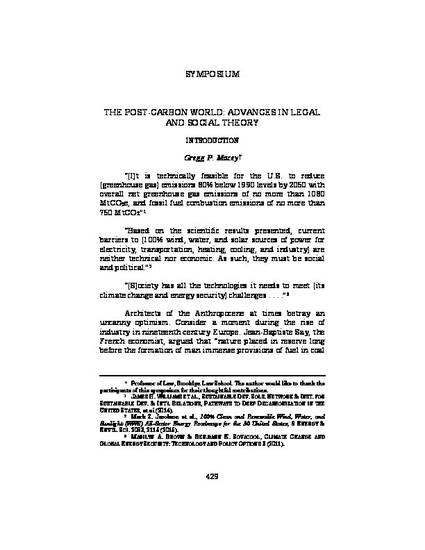
Article
Symposium: The Post-Carbon World: Advances in Legal and Social Theory
Brooklyn Law Review
(2017)
Abstract
The story of energy is one of profound transition. In little more than a century, the world economy moved from felled forests to coal to oil and gas to synthetic fuels and renewable sources. With these changes came shifts in energy markets, the structure of firms, the scale of risks, and new attempts to coordinate responses to those risks. Most recently, nations and cities alike have begun to adopt green industrial policy. Social movements now demand that, to avoid catastrophic climate change, we leave much of our remaining burnable carbon, including Arctic oil and Canadian tar sands, in the ground. Yet fossil-fueled industry has for some time outpaced not only the assimilative benevolence of atmosphere and ocean, but also our capacity for prediction and control. As legal scholars interpret descriptive elements of Intergovernmental Panel on Climate Change reports and make normative claims about our carbon-intensive economy, they must grapple with sociotechnical systems at different scales, using multiple levels of analysis and a mix of theoretical tools. They need to understand the political economy of these systems, their path dependence, and their susceptibility to disruption as the target of new social movements. Brooklyn Law School's 2016 David G. Trager Public Policy Symposium, "The Post-Carbon World: Advances in Legal and Social Theory," brought together scholars uniquely qualified to discuss how such research can, and should, proceed. They approach energy systems from varied disciplines, including sociology, environmental law, science and technology studies, energy law, and public policy. Yet the aim of this issue is not to showcase the range of perspectives that they bring to the green energy transition. We wish to consider how the research questions that legal scholars ask about the imperative to "decarbonize" state, national, and global economies could be advanced through a richer sense of sociotechnical systems, social movements, and institutional change. To ignore these concerns, to - paraphrasing symposium speaker Sheila Jasanoff - uncritically accept models, misread technology as only material, ignore routine practices as repositories of power, and erase history and time as factors that shape development pathways is to invite unintended consequences, widening inequality, or worse. This issue collects papers by symposium speakers Thomas Beamish, Shannon Elizabeth Bell, Eric Biber, John Dernbach, Scott Frickel, Alexandra Klass, Uma Out, Shobita Parthasarathy, Jim Rossi, David Spence, Amy Stein, and their co-authors.
Disciplines
Publication Date
Summer May 17, 2017
Citation Information
Gregg P. Macey, Symposium: The Post-Carbon World: Advances in Legal and Social Theory, 82 Brooklyn Law Review 429 (2017).
